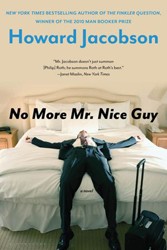“ — that you’ve broken your vow?” In Howard Jacobson’s witty but ultimately depressing exposition of relativist morality, the blue notes of that old lyric are delivered not by just one betrayed lover, but by two wife swappers, both wives, and everyone connected to them. A broken — lapsed? — marriage vow cannot be put by, or confessed in earnest sorrow. Dialogues among the principal characters are witty verbal duels, but the underlying dialogue is between author and reader. Jacobson assumes a readership so well versed in the English literary tradition and the idiom of the common man that he can rely on us to complete his references, as his principal characters can rely on their spouses to complete each other’s.
The four principal characters are the two couples — the husbands are life-long friends — who engage, in the one case, in “nice sex,” indeed in “nice” everything, being not only spouses but also business and creative partners (they co-author commercially successful children’s books) and, in the other case (at least the husband’s) in serial sex, none of it nice, joyous, or designed to bring him anything but disappointment. This husband, Marvin Kreitman, universally despised and clearly despicable, is ultimately the novel’s most sympathetic character because, like Macbeth, he knows from the start that his conquests cannot make him anything but unhappy. Marvin does love four women: his mother, his wife, and his two daughters (with Shakespearean names). The mother brought him up to be Britain’s prime minister; but when he settled instead for his father’s grubbily hard-won millions as the “king” of London’s leather merchants, she despised Marvin for ever after, and was always available to him to soothe him with a despising he felt as maternal love. The wife, raised in the legend of her own incapacity, accepted Marvin’s largess and his absences from her bed as he kept appointments with his five mistresses, a feat of administrative juggling that left him lying next to them with his mind in his appointment book and his hands appraising their skin as grades of leather.
Charlie, the gentile husband of the “nice” couple (his wife’s name is also Charlie, but Jacobson steers us through that minefield by letting us in on, and then designating them by, their pet nicknames) envies Kreitman his seeming cavalier life and, under the influence of alcohol, goads him into agreeing to the wife swapping he himself can never make “nice.” The couples are presented in narrative word play of startlingly insightful wit. Not so witty is Nyman, a character of no character at all. Playing hide and seek among the other players, Nyman (No man), of indeterminate age, ethnicity, background, or ambition — in Beatles terms, a “nowhere man” — is used as Jacobson’s avatar of amorality to trigger all the others’ self destructions.
Who’s Sorry Now?, first published in England almost a dozen years ago, and divided into three books and a “Finale,” has a simple plot: the build up to, the experience of, and the near restoration after — the swapping. Throughout, it offers insights to the dangers of middle- and upper-class relativist moral values. But as we move toward some expected restoration, the verbal pyrotechnics begin to wear thin, and by Book Three they are somewhat at war with the sorrows into which we have been led. In the three-page “Finale” we learn that for Marvin Kreitman there can be no restoration because he can only approach the self-despising he knew before by “inviting,” through sexual masochism, “oblivion.” After all that enticing by verbal sleights of hand, Jacobson now renders a kick in the gut and leaves the reader to close the book in silence.





